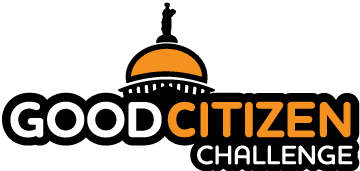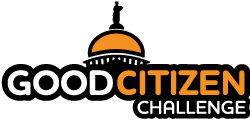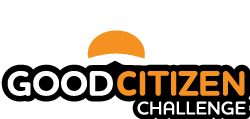At-Home Challenge Activities
Do at least one activity below…
and you’ll be eligible for monthly prize drawings. The more activities you submit, the more chances you have to win! We’ll keep track of entries on the website’s public leaderboard and hold prize drawings on December 30, January 27 and February 17 to recognize outstanding work and to give away gift cards and other prizes.
Finish four activities…
(one in each category), and pass the sample U.S. Citizenship test before March 5, 2021 and you (or your team) will be eligible for the grand prize drawing on March 10. The winning person or team will receive a $500 gift card to a local business of the winner’s choice!
Sorry. The deadline to submit contest entries for these activities has passed. Feel free to complete the activities anytime regardless!

History Activities
Learning about history can help us better understand the present and put it in perspective. And knowing how people got through hard times in the past can help us get through the difficulties we’re facing today.
- Visit a memorial in your city or town and find out who put it there and why. Do you recognize any of the names on it?
- Research the name of your street, your school or a local park. What can you find out about when and how it was named? Does it reference a person? If you can’t find information online, try contacting your local historical society or town offices. You could also have an adult pose the question on your Front Porch Forum.
- Draw a portrait of one of these notable Vermonters from history. Research them online first to find out about who they were and what they contributed to Vermont. Reminder: Wikipedia is a good starting place, but always verify the information you find there through other sources such as libraries, universities, historical societies, etc. Try to incorporate what you’ve learned into your artwork.
- George Aiken (1892-1984)
- Alexander Twilight (1795-1857)
- Consuelo Northrup Bailey (1899-1976)
- James Hartness (1861-1934)
- Lucy Terry Prince (1730-1821)
- Learn about the biggest natural disaster in state history by listening to “Vermont’s Great Flood,” an episode of the podcast “Before Your Time.” Produced by the Vermont Historical Society and Vermont Humanities, it explains how the flood killed 84 people, devastated the state — and was an important turning point. It even inspired Plymouth Notch-born president Calvin Coolidge to deliver his famous speech, “Vermont Is a State I Love,” in which he describes it as a “brave little state.” Find it at beforeyourtime.org.
- The Abenaki people were here in Vermont long before European colonists arrived. Find out more about their cultural heritage and the struggles they have faced by attending this free virtual event, “We Are Still Here,” part of Vermont Humanities’ First Wednesdays series, on February 3, 2021. Find more information at vermonthumanities.org.
- Test your knowledge of Vermont by playing Virtual Vermont Trivia. The Vermont Historical Society hosts these free, all-ages competitions on Zoom on Wednesday nights in January. Each night focuses on a different theme: Geography and Place Names, Famous Vermonters, People and Customs, and Vermont Miscellany. A championship on February 3 requires an entry fee — and includes prizes. Find more information at vermonthistory.org/calendar. Send in a Good Citizen entry each time you play.
- Help document the history of the coronavirus pandemic by contributing your own photographs, stories, poems and videos to the Vermont Historical Society’s COVID-19 archive. On its website, VHS asks “What’s different in your community — empty streets and empty shelves, signs and restrictions, people talking to each other across the street? What’s different in your own home — new routines, new office setups, new hobbies?” Find more information and a form explaining how to contribute at covid-19.digitalvermont.org. Send in a Good Citizen entry for each contribution you make.
-
Vermont’s border with Canada has been closed to all but essential travel during the pandemic, but the dividing line hasn’t always been so difficult to cross; French-Canadian culture has had a huge influence on the state. Listen to “What’s the History of French-Canadian Immigration in Vermont?” an episode of VPR’s Brave Little State podcast, to learn more. Find it at bravelittlestate.org. Do you know any Vermonters who have roots in Canada?
-
The Vermont we know today has also been shaped in important ways by events that happened 400 million years ago. Learn more about that period by listening to the episode of VPR’s podcast Brave Little State entitled: “How Has the Geology of Vermont Affected Its Character?” Find it at bravelittlestate.org. It rocks!
-
Our understanding of the past is constantly evolving. Learn more about new research into Vermont history during free noontime Zoom events on the Third Thursday of the month. Vermont Historical Society has scheduled two during the Challenge period: “The Devil’s Cabinet: The Eddy Family of Spirit Mediums” (December 17) and “The Buffalo Soldiers in Vermont, 1909-1913” (February 18). Send in a Good Citizen entry for each one you attend. Find more information at vermonthistory.org.

Government Activities
Democracy is not a spectator sport! For it to work, you have to get off the sidelines and take action. Here are some activities that will help you understand how our government of the people, by the people and for the people actually works, and how you can participate in it.
- Much of local and state government has moved online during the pandemic. Find out how you can watch your city council or school board meeting online and join the meeting. If you can’t view the meeting while it’s happening, watch one on TV or online via your local cable access channel. Don’t know when these happen? Look on your city website, call the town offices, or have an adult post a question about it on your local Front Porch Forum.
- Stream the 2020 documentary Boys State (rated PG-13). Winner of the U.S. Grand Jury Prize for a documentary at this year’s Sundance Film Festival, the movie follows 1,000 teenage boys as they attempt to form a government during a weeklong summer camp in Austin, Texas. Available on Apple TV+.
- Find out how you can use your local library during the pandemic. What resources are available? Check out an item or attend a remote class or event. Be sure to return any items you borrow on time.
- In October, VPR’s “But Why: A Podcast for Curious Kids” released an episode answering questions about the election. Listen to this episode, called “Why Can’t Kids Vote?” Find it at butwhykids.org.
- Read This Is What Democracy Looks Like: A Graphic Guide to Governance, a comic book about democracy produced by the Center for Cartoon Studies, based in White River Junction. Download it at cartoonstudies.org/cartooningprojects/democracy.
- “Gerrymandering” is the practice of drawing congressional districts in a way that favors one political party over another. Learn how this practice affects elections by playing Gerry Mander: A Voting District Puzzle Game by Vermont-based GameTheory. Find the game at gametheorytest.com/gerry.
- Vermont is one of several states that has a part-time legislature. In a typical year, the Vermont House of Representatives and the Vermont Senate meet at the Statehouse in Montpelier from January until May or early June. How does this schedule affect who is able to serve in the Vermont legislature? Find out by listening to “Low Pay, Weird Schedule: Who Exactly Can Pull Off the Legislator Lifestyle?” an episode of VPR’s podcast “Brave Little State,” available at bravelittlestate.org.
- Attend the free Zoom lecture “Libraries in the Time of Covid” on Wednesday, March 3, 2021, part of the first Wednesdays series organized by Vermont Humanities. From the event description: “Libraries have a central role in their communities, often being the only place to access free internet and other technology necessary for life in 2021. In the wake of the pandemic, libraries have had to both evaluate and rapidly respond to the changing world. Librarian Jessamyn West helps us to understand the role of the library in these unusual times.” Find more info at vermonthumanities.org.
- Vermont cities and towns will be electing new leaders on March 2, 2021, Town Meeting Day. Watch or listen to a debate between local candidates for office. Find out when these are happening by checking the website of your local cable access channel, or have an adult post a question about it to your Front Porch Forum.
- Attend the free Zoom lecture “Slow Democracy and the Power of Neighborliness,” on Wednesday, February 3, 2021, part of the First Wednesdays series organized by Vermont Humanities. From the event description: “Author and advocate Susan Clark will explain the Slow Democracy movement in which ordinary people mobilize to find local solutions to local problems. In the process some find they can bridge the ‘us-them’ divide so prevalent in our national politics.” Find more info at vermonthumanities.org.
- Watch the 16-minute documentary Ethan 2018, about a Vermont teenager Ethan Sonneborn’s 2018 run for the Democratic nomination for governor. Does it inspire you to get involved in politics? Available on Vimeo.

Community Service Activities
Vermont’s state motto is “Freedom and Unity.” In other words, while we prize our independence, we also recognize the importance of working together and looking out for one another. These activities will help you help others. That will make you feel good, too!
- Shovel snow for a neighbor. Don’t know who needs help? Have an adult pose a question to your Front Porch Forum to find out.
- Make a card or mail a care package to an elderly person you know — or, with an adult’s help, find elderly Vermonters you don’t know who might appreciate a card. COVID-19 is particularly dangerous for people over 65, so many of them have been isolating themselves over the past few months. This winter is a great time to remind them that they haven’t been forgotten.
- Conduct a socially distanced donation drive for your local food shelf. Invite your family, friends and neighbors to contribute. If you want to broaden your reach, have an adult promote it on your Front Porch Forum.
- Learn to make cloth face masks and donate masks to people who need them. Send in a Good Citizen entry each
time you donate masks. Masks must be made by students or by a student-adult pair. Find a mask-making tutorial at kidsvt.com/make-masks. - Listen to or read Willem Lange’s Favor Johnson: A Christmas Story. This tale, about a Vermont farmer, his dog and a flatlander doctor, shows the ripple effects of a good deed. Find a recording of the story, which is broadcast every December on VPR, at VPR.org.
- Green Up Day is a Vermont tradition. On the first Saturday in May, thousands of volunteers help pick up trash along the state’s roadways. Green Up Day 2021 will take place on Saturday, May 1. Help inspire people to participate by entering the Green Up Day Poster Art and Writing Contests. Art submissions must be received by February 1. Poem and essay submissions are due on March 1. This year, Green Up Day added a contest for a 60-second video and a jingle. Those are due on April 1. Contests are open to all K-12 students, and you can enter them all if you’d like. Winners receive prizes. Find details at kidsvt.com/green-up-day-contests. Send in a Good Citizen submission for each contest you enter.
- Write a thank-you note to an essential worker who has helped you or your family during the pandemic. Send in a Good Citizen submission for each note you send.
- Make a brightly colored sign to put in your yard or your window to cheer up passersby.
- Paint a rock with a message of hope and leave it outside for someone else to find.
- Organize a fundraiser or donation drive with someone who disagrees with you politically, or bring two opposing sides together to do something positive that benefits the community. Be creative! Show that Vermonters can work together for the public good.

News Literacy Activities
Being a Good Citizen means keeping up with current events and seeking out responsible, fact-based local journalism. As our lives increasingly move online, being a Good Citizen also means understanding how the technology platforms we use every day influence the information we see and our reactions to it — and the information that others have about us.
- Tune in to one of the governor’s twice-weekly press conferences about COVID-19 on VPR. Pay attention to how the governor and other state officials explain what’s going on, and how the reporters ask them to clarify and expand on the topics. Send in an entry every time you listen. Find more information about how to listen at vpr.org/term/coronavirus. You can find all of the press conferences archived at the ORCA Media YouTube channel.
- Journalism isn’t just about reporting facts; it’s also about telling a compelling story. After an outbreak of the virus killed 21 residents at Birchwood Terrace, Seven Days reporters Derek Brouwer and Colin Flanders reconstructed how it happened. Read their story, “It’s in the Building: How COVID-19 Overwhelmed a Burlington Nursing Home,” from the June 3, 2020 issue. Did it give you a better understanding of the pandemic and its effect on nursing home residents and staff? If so, how?
- How do journalists interview and draw out their subjects? How are they doing their jobs in this difficult time? Erica Heilman, host and producer of the podcast “Rumble Strip,” which airs on VPR, will tackle these questions and more during her free virtual talk, “Making Rumble Strip in My Closet,” on Wednesday, January 13 (rescheduled from January 6). Attend this free, virtual event, which is part of Vermont Humanities’ First Wednesdays series. Find more information at vermonthumanities.org. Find out more about the podcast at rumblestripvermont.com.
- Watch the 1999 documentary The Black Press: Soldiers Without Swords (not rated), which recalls the pioneering — and largely forgotten — efforts of Black journalists who chronicled Black lives prior to the civil rights movement. Available for rent on Vimeo.
- Watch the 2020 documentary Coded Bias (not rated), which reveals widespread discrimination in artificial intelligence. A free virtual screening is available to all Vermonters during Computer Science Week, December 7-13. The Vermont International Film Foundation is also screening the movie until December 17. Find information on both at sevendaysvt.com/coded-bias. Common Sense Media labels it as appropriate for ages 11 and up.
- Watch the documentary-drama hybrid The Social Dilemma (PG-13). This 2020 film explores how social media platforms manipulate users’ emotions. It includes numerous interviews with some of the people who created these tools who are now alarmed by the effect their creations are having on society. Available on Netflix.
- Get a copy of your community newspaper in print, or visit its website. Read five stories. Do you recognize any people you know? Find a list of Vermont’s 10 daily and three dozen non-daily newspapers at the Vermont Press Association website, vtpress.org.
- Make your own newsletter for your family, neighborhood or school. What stories would be important to tell? How would you document this pandemic winter? What kinds of information do you and your readers need today? Interview people you see every day about what they’re doing differently this winter. Be sure to check your facts before you publish them.
- To learn more about some of the most important local news stories in any given week, watch or listen to the most recent episode of “Vermont This Week,” on Vermont PBS — it’s also broadcast Friday evenings on VPR. Find the most recent episode at vermontpbs.org/vtw.
- Freedom of the press is guaranteed in the First Amendment to the U.S. Constitution, but the media doesn’t have the same protections in the Philippines. There, journalist Maria Ressa has been arrested and may be sent to prison for her persistent questioning of the government. She explains how the authoritarian regime now in power uses social media to stifle dissent in “The Dictator’s Playbook,” an episode of the Center for Humane Technology’s podcast “Your Undivided Attention.” Find it and listen to it at humanetech.com/podcast.


